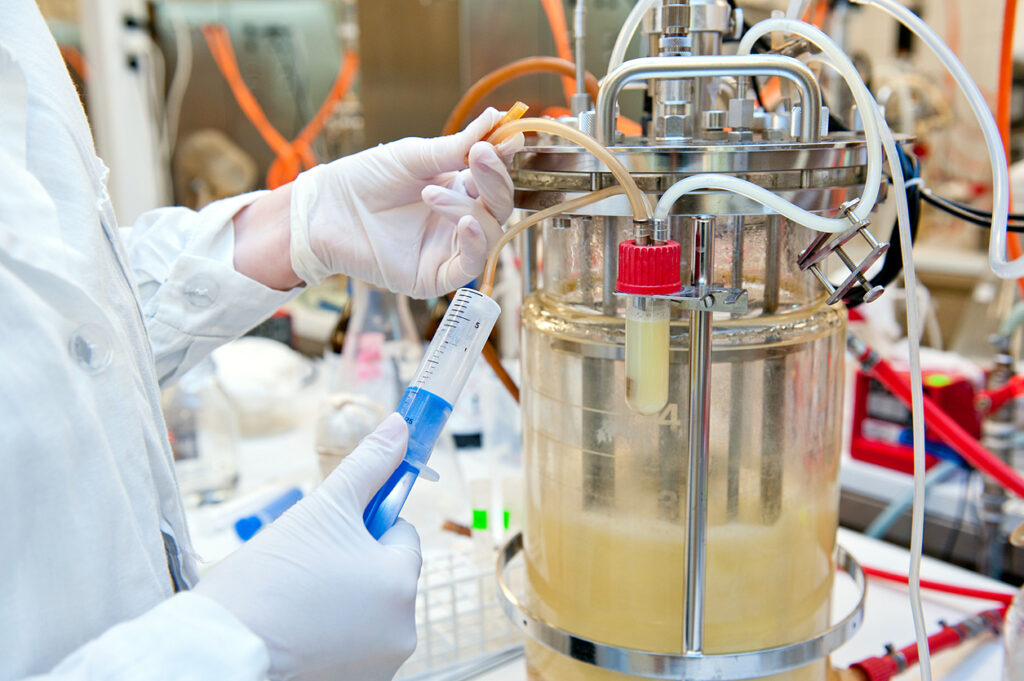Project summary
Methane is used primarily to provide energy or heat via combustion. A lot of methane is produced from anthropogenic sources, which constitutes 60% of annual global emissions. Increased emissions have negative consequences as methane is a greenhouse gas with approximately 80 times the impact of carbon dioxide.
However, methane represents also an enormous resource and can be treated as a platform
chemical for conversion into a range of higher value products. This is especially encouraging when methane from sustainable sources like landfills or anaerobic digesters are used or otherwise sources that are not economical to process for conventional heating. These economic incentives and the changing attitude towards sustainable production of both fine and commodity chemicals results in the growing interest in the biological conversion of methane.
Potentially, polyhydroxyalkanoate (PHA) copolymers with desirable properties (such as PHBV copolymer) could be produced from methane as a feedstock. PHA copolymers are recognised as excellent candidates to replace conventional petroleum-derived polymers. The general aim of the project is evaluate the possibility of synthesizing PHA copolymers from methane as a primary substrate via utilization of mixed microbial. Moreover, the objective is to improve knowledge on symbiotic interactions within methanotrophic consortia and investigate underlying mechanisms in PHB synthesis. The project is financed by National Science Centre in Poland according to UMO-2019/35/D/ST8/03530 agreement within SONATA15 programme framework.

Objectives
The general aim of the project is evaluate the possibility of synthesizing PHA copolymers from methane as a primary substrate via utilization of mixed microbial. In the proposed research we aim to investigate the strategy to control the PHA copolymer composition, by adjusting the concentration and identity of the carbon source fed to the reactor in turns with methane. Increasing the molar content of monomers with longer carbon chains, such as 3-hydroxyvalerate is the secondary objective.
- To investigate the relation between microbial composition of mixed methylotrophic cultures enriched in selected process conditions (temperature, pH, ratio of methane/oxygen, availability of nitrogen and carbon dioxide) and composition of polyhydroxyalkanoates produced
- To determine whether specific composition of the desired co-polymer can be obtained via alternating the feeding regime between methane and an alternative carbon source
- To identify and characterize novel methylotrophic organisms via high-resolution sequencing of fermentor metagenomes,
- To conduct bioinformatic, system-level analyses of metatranscriptome, subjecting methanotrophic community to timed feed pulses of methane and alternative carbon source to provide global understanding of novel regulation mechanisms and to dissect molecular signals regulating the synthesis of biopolymers
- To determine the effect of the gas substrate pressure on methanotrophic microbial consortia and yields of selected PHBV copolymers
Work packages
- Enrichement of PHA-producing methanotrophic microbial consortia
- Mixed culture fermentation of methane to PHA
- Biological regulation of the process and molecular determinants of the PHA production

Expected impact
Using high-throughput omic approaches (metagenome sequencing, metatranscriptomics and metabolomics) we will attempt elucidation of both compositional and transcriptional dynamics in these methanotrophic consortia. It will enable more fundamental understanding of mutual microbial interactions and their influence on the methanotrophic fermentation. The application of the proposed strategy may also constitute the basis for further development of technologies leading to production of PHA from methane, whose wider adoption offers a potential solution to carbon sequestration and green house gases (GHGs) reduction.


